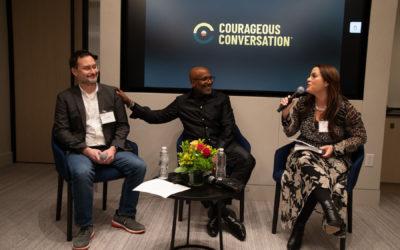By Nosheen Iqbal—Oct 20, 2016
Lupita Nyong’o is, rumour suggests, a nightmare. Difficult. Cold. Prone to making heavy demands. She also quite famously won an Oscar for her first film straight out of Yale School of Drama, just three years ago. So, you might expect a degree of monstrous entitlement, but the buzz spreading through the London film festival seems exaggerated, even by industry standards. Chatshow clips – Jimmy Kimmel and The Ellen Show, old episodes of Conan O’Brien and Letterman – offer no evidence of brattiness.
“I don’t feel a need to be anyone but myself,” she says of her reputation. The actor, who was born in Mexico and brought up in Kenya, is perched like a doll on the edge of a sofa when we meet: buttoned up in a full-sleeved and collared A-line Pucci dress that fans out across the seat, her legs crossed, hands folded on knees.
I ask if there is a gulf between the public and private Lupita. She suppresses a small laugh. “I codeshift between my mother and father, let alone the industry and my home life. So, yeah, I think we naturally codeshift and that’s something I can’t deny I do, but the version of me … ” She finishes by waving at herself and tilting her head as if to say, “Yes, this is me” and “No, it’s not a grand act.”
Her new film, Disney’s Queen of Katwe, is billed as her first “proper” role since 12 Years a Slave, though Nyong’o has been in a Star Wars film and The Jungle Book along the way. Queen of Katwe is a true story, directed by Mira Nair (Salaam Bombay, Monsoon Wedding, The Namesake) and based on the life of unlikely teenage chess champion Phiona Mutesi, from the Ugandan slums of Kampala.
“Mira Nair and I have known each other for a very long time,” says Nyong’o. “I once worked as an intern for her, and our families are friends, but she emailed me to say she had the role written for me and would I please say yes to doing it? Less than 10 pages into reading the script, I sent an email: ‘I must make this film.’”
Nyong’o plays Harriet, a widowed mother of five, whose naggy, protective survival instinct has no truck with the do-gooding help – coach Robert Katende (David Oyelowo) – promising to change the lives of Phiona and her family. Harriet’s life is hard but it’s hers, thanks very much. Still, ‘Katwe is a feelgood triumph for the sporting underdog. “It’s an uplifting African story and we could do with more of those.”
In the crassest terms, think Cool Runnings meets Slumdog Millionaire, but with a lot of dramatic set pieces over chess boards. Stephen Colbert declared it his “favourite movie of the year so far” and said it made him weep, the New York Times reviewed it as irresistible, and Rolling Stone claimed it “hits you like a shot to the heart”.
A harassed matriarch is not an obvious choice for Nyong’o, whose decisions have been deliberate and few, post-Oscars. She narrows her eyes.
“The biggest gift or award the Academy has given me is choice. I am in a position where I don’t have to take on roles out of desperation or to help pay my bills.” Nyong’o’s voice hovers between mannered plumminess and international school student. “I can choose the projects I can say something with. It’s not something I take for granted.”
It is not, I realise, that Nyong’o is haughty, more that she is atypical of her peers; she isn’t on a charm offensive, just businesslike: articulate and smart, clipped and polite. Does she worry about blowback for not conforming to expectation? Her first role post-Steve McQueen’s 12 Years a Slave, after all, was a play written by a university friend about the Liberian war.
“I don’t have that rulebook. So I have no idea. That’s honestly my answer. Art is political in whatever way you slice it,” she says, matter-of-factly. “It’s not something I shy away from. I grew up in a political family so it’s an environment I recognise.”
She frequently calls out Hollywood’s tendency to mark her as its proof of doing the race stuff right, but making her the exception and not a norm. This month, for the third time in as many years, she appeared on the front of the US edition of Vogue, which ran the coverline: “I want to create opportunities for people of color.” It’s not the sexiest way to sell a fashion glossy, but Nyong’o is unapologetic.
“Films inspire people to feel differently. A lot more can be done. We can be more empathetic when we realise how much more alike we are than how different we are.”
Read more at The Guardian.




